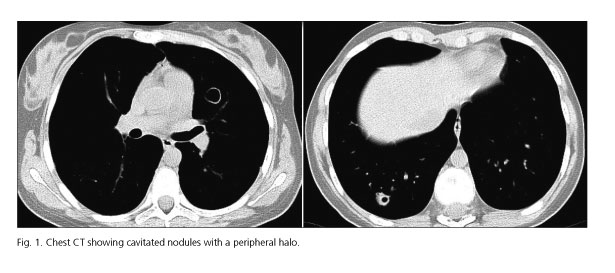Meu SciELO
Serviços Personalizados
Journal
Artigo
Indicadores
-
 Citado por SciELO
Citado por SciELO -
 Acessos
Acessos
Links relacionados
-
 Citado por Google
Citado por Google -
 Similares em
SciELO
Similares em
SciELO -
 Similares em Google
Similares em Google
Compartilhar
Revista Española de Enfermedades Digestivas
versão impressa ISSN 1130-0108
Rev. esp. enferm. dig. vol.109 no.4 Madrid Abr. 2017
https://dx.doi.org/10.17235/reed.2017.4564/2016
LETTERS TO THE EDITOR
Invasive pulmonary aspergillosis in an immunocompromised patient with severe ulcerative colitis
Key words: Immunosuppressive therapy. Inflammatory bowel disease. Opportunistic infection. Leukapheresis.
Dear Editor,
Immunosuppressive therapy is the main risk factor for opportunistic infections in patients with inflammatory bowel disease (IBD) (1). We present a thought-provoking case of an opportunistic infection, which resulted in treatment difficulties and morbidity.
Case report
A horse rider, 16-year-old female with a 2-year history of ulcerative colitis (UC) (E3 Montreal classification), while in remission with oral mesalamine, had her first mild-moderate UC flare requiring oral steroids (0.5 mg/kg). One month later, she was admitted to the hospital with a severe UC flare (Montreal classification S3, Mayo Score 12), needing intravenous steroid (1 mg/kg) treatment.
After five days, there was only a partial steroid response (Mayo Score 5). Moreover, she presented a progressively increasing cough and hemoptysis without clinical or analytical repercussions. The chest radiograph and CT showed two cavitated nodules with a peripheral halo in both lungs (Fig. 1). Bronchoscopy and bronchoalveolar lavage demonstrated invasive pulmonary aspergillosis.
Voriconazol (4 mg/kg/12 hours) was prescribed. Steroids were tapered and leukapheresis (LCAP) was started to avoid immunosuppression. Intensive LCAP (two sessions/week during five weeks) was followed by weekly sessions and monthly sessions, finally obtaining UC remission. The patient had no cough or hemoptysis, and the pulmonary lesions shrank on CT.
LCAP was maintained for six months, until voriconazol was removed.
Discussion
The risk of fungal infection in IBD seems to be low, but morbidity and mortality are high (1). In patients with a fungal infection, immunomodulator therapy should be stopped and standard therapy for the infection implemented (2). Our case shows the relevance of a history of horse contact. The presence of Aspergillus fumigatus in the equine nasopharyngeal cavity can infect immunocompromised humans (3). This case highlights the fact that opportunistic infections in immunocompromised IBD patients require a high degree of suspicion and restrict therapeutic options. In this context, LCAP represents an effective therapeutic option for both remission and UC maintenance treatment (4).
Acknowledgements
Tosca-Cuquerella J and Mínguez M (Gastroenterology Department), Ana Ferrando (Pneumology Department), María Jesús Puchades and Isidro Torregrosa (Nephrology Department).
David Marti-Aguado, María Pilar Ballester and Marta Maia Bosca-Watts
Gastroenterology Department. Hospital Clínico Universitario de Valencia.
Valencia, Spain
References
1. Toruner M, Loftus EV Jr, Harmsen WS, et al. Risk factors for opportunistic infections in patients with inflammatory bowel disease. Gastroenterol 2008;134(4):929-36. DOI: 10.1053/j.gastro.2008.01.012. [ Links ]
2. Rahier JF, Magro F, Abreu C, et al. Second European evidence-based consensus on the prevention, diagnosis and management of opportunistic infections in inflammatory bowel disease. J Crohns Colitis 2014;8(6):443-68. DOI: 10.1016/j.crohns.2013.12.013. [ Links ]
3. Guida N, Mesplet M, Di Gennaro E, et al. Aspergillus fumigatus in nasopharyngeal cavity of horses. Rev Iberoam Micol 2005;22(3):160-2. DOI: 10.1016/S1130-1406(05)70031-0. [ Links ]
4. Saniabadi AR, Tanaka T, Ohmori T, et al. Treating inflammatory bowel disease by adsorptive leucocytapheresis: A desire to treat without drugs. World J Gastroenterol 2014;20(29):9699-715. DOI: 10.3748/wjg.v20.i29.9699. [ Links ]














